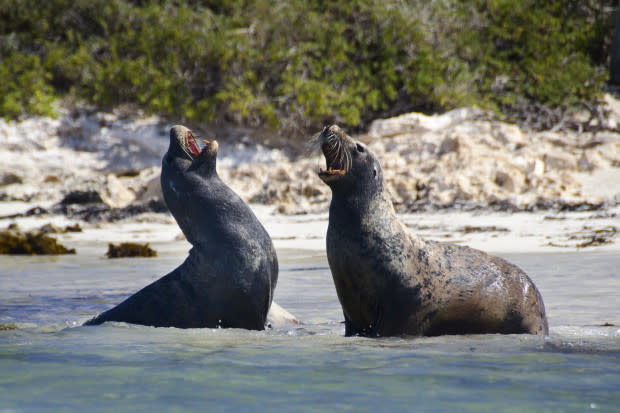Sea Lions Charge Beachgoers at San Diego's Popular La Jolla Cove

San Diego's La Jolla Cove is a beloved beach because of its picturesque beauty, including native sea lions that inhabit the surrounding area. This summer, however, sea lions along the California coast have been seemingly more agitated by people who get near them. Beachgoers at La Jolla earlier this week learned this lesson the hard way.
When the animals began to swim close to shore, a lifeguard warned beachgoers over a loudspeaker to keep their distance. Some of them even began to charge after people who weren't going away fast enough.
"Everybody, let's please give that large, male sea lion plenty of room," the announcement said, as seen in viral video of the incident. “They have bitten people, and they are protected animals." Male sea lions can grow up to 1,000 pounds, especially during breeding season.
Some commenters questioned why the beach isn't closed to the public and given back to the animals who lived there first. It's an idea that's already been implemented nearby. Point La Jolla and Boomer's Beach are now closed for a few months out of the year for pupping season, and they may soon be closed year-round to beachgoers after the city of San Diego applied for a permit with the state to do so.
The city is well aware of residents getting too close to their unpredictable neighbors.
"Members of the public have been observed trying to touch, take selfies, and get as close to sea lions as possible which is a dangerous situation for both the public and the animals," a statement from the government said. "Human interactions with adult sea lions and their young during [pupping season] could result in injury or abandonment of sea lion offspring and aggressive behavior from adult sea lions. These interactions are not only dangerous for both humans and wildlife, it may be a violation of the federal Marine Mammal Protection Act which helps to safeguard these animals."
While it hasn't been scientifically confirmed, the rise in toxic algae blooms in California may explain some of the sea lions' recent behavior. John Warner, the CEO of Los Angeles' Marine Mammal Care Center, explained how the current toxic bloom may be causing attacks like these.
"It literally affects their brains, and the behavior of sea lions—especially when the concentrations of domoic acid are quite high—is drastically changed," Warner told NBC News. "They become symptomatic in ways that are just unpredictable in terms of their behavior, [including] aggressiveness that we don't normally see."
Yes, sea lions can be cute, but for both your and their sake, it's best to admire them from afar.
